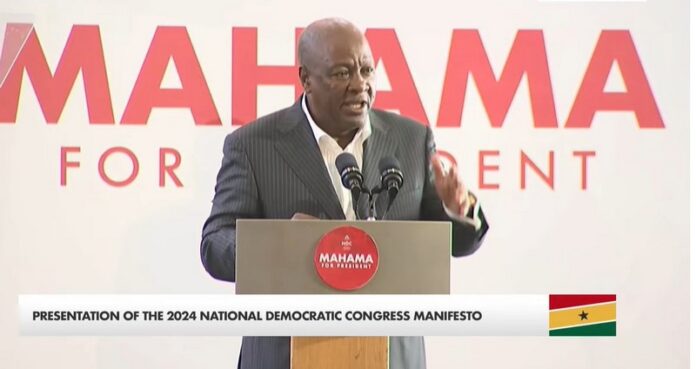The National Democratic Congress (NDC) unveiled its manifesto on Saturday, August 24, 2024, presenting a detailed strategy aimed at revitalizing Ghana’s economy, reducing economic hardships, and enhancing governance.
The manifesto serves as a roadmap for economic recovery, proposing initiatives such as a National Economic Dialogue, tax rationalization, and emergency measures to stabilize the Ghana cedi.
However, as the election approaches, some claims made in the manifesto require verification.
This prompted DUBAWA to fact-check these claims to ensure the accuracy of statements being circulated during the campaign period.
The manifesto launch was broadcast live on various traditional media platforms and streamed on Facebook, eliciting a wide range of reactions and comments from the public.
Claim 1: “They inherited a budget that ran a deficit of 6.1% with zero borrowing from the central bank which is the Bank of Ghana.” (13:47-14:06)
Verdict: False. Data from the 2017 budget statement and economic policy, the International Monetary Fund (IMF) and the World Bank recorded 8.7% and 9% and 8.7%, budget deficit respectively.
Verification
A budget deficit occurs when a government’s expenditures on public services, infrastructure, and other projects exceed the revenue it generates from taxes, fees, and other sources. The International Monetary Fund (IMF) explains that a budget deficit can adversely impact the financial health of a country when expenditures surpass revenue.
After a search through the 2017 Budget Statement and Economic Policy, it was revealed that the overall budget deficit was 8.7% of GDP.
Meanwhile, according to a press release issued by the IMF on Feb. 10, 2017, after it visited Ghana, it placed Ghana’s overall budget deficit at 9%.
“In 2016, the overall fiscal deficit (on a cash basis) deteriorated to an estimated 9 percent of GDP instead of declining to 5¼ per cent of GDP as envisaged under the IMF-supported programme.”
More evidently, a document from the World Bank titled Ghana Public Expenditure Review indicated 8.7% as the budget deficit for 2016. This is sighted on page 11 of the document. “After successfully cutting the fiscal deficit from 10.1 percent of GDP in 2014 to 6.3 percent in 2015, the fiscal deficit rose to 8.7 percent in 2016”. The document indicated.
However, the 6.1% quoted by the NDC flagbearer may stem from the projected budget deficit of 2016. On page 45 of the 2016 budget, it revealed that the projected budget deficit for 2016 was 5.3%; however, that did not materialize, with the final deficit being 8.7% as captured in the 2017 budget.
“Mr. Speaker, based on the revenue and expenditure estimates, the 2016 budget will result in an overall budget deficit of GH¢8,407.7 million, equivalent to 5.3 percent of GDP.” The statement was revealed.
Claim 2: They (NPP) inherited cocoa production of more than 960,000 metric tonnes with COCOBOD that was making profits and owed only 1.5 million cedis to the central bank. (00:01-00:14)
Verdict: Misleading . Data from the COCOBOD revealed that even though cocoa production before they left office was 960,000 metric tonnes, it did not make profit in 2016 before leaving office. It made a loss of 1.9 million cedis.
Verification
DUBAWA relied on data from the Ghana Cocoa Board (COCOBOD) to ascertain the veracity of the claims made.
Its data revealed that it indeed produced 960,000 metric tonnes of cocoa in 2016. However, relying on the publicly available financial report of COCOBOD which is its 48th annual report and financial statements (page31), it indicated that COCOBOD recorded a loss of 1.9 million cedis in the 2015/2016 crop season, and these losses continued till 2020.
“During the 2016/2017 financial year, COCOBOD made a loss of 394.85 million cedis compared to a loss of 199.41 million cedis recorded in 2015/2016,” The report said.
Source: Ghana Cocoa Board (COCOBOD)
It is however necessary to indicate that during the tenure of John Mahama from 2012 to 2016 COCOBOD made losses and profits. The financial trajectory of COCOBOD from 2012 to 2016 highlights significant instability. The drastic loss in 2013 (page 20) followed by a major profit in 2014 hints at possible interventions or market recoveries that were not sustained in subsequent years.
| Financials of COCOBOD from 2012-2016 | ||||
| 2012 | 2013 | 2014 | 2015 | 2016 |
| 61 million (loss) | 1 billion (loss) | 329 million (profit) | 152 million (profit) | 199 million (loss) |
Source: Ghana Cocoa Board (COCOBOD)
Conclusion
The claim that the NDC left a budget deficit of 6.1% was proven false, as credible sources like the IMF, the World Bank and the Ministry of Finance documented a significantly higher deficit of 8.7% to 9%.
Additionally, the assertion that COCOBOD was making profits before the NDC left office in 2016 was also found to be incorrect. COCOBOD actually recorded losses, including a ₵1.9 million loss in 2016. Even though they made profits in 2014 and 2015, they also made losses in 2012 and 2013.
Source: dubawa.org



